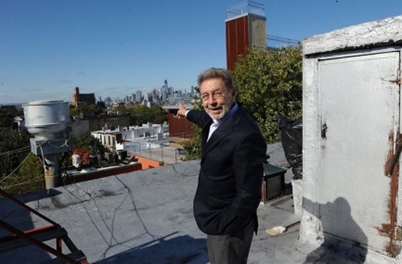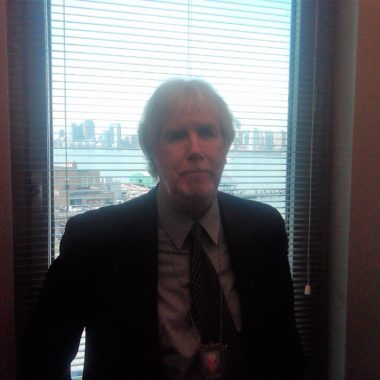Pete Hamill was a poet disguised as a reporter disguised as a novelist disguised as a memoirist – there is such a word, I assure you, but Pete would never have used it. It sounds too phony. Like the pre-recorded cheers they pipe in for the radio and TV gasbags at COVID-emptied ballparks.
Remember Pete’s columns in the New York Post and the Daily News? Back when us old folks learned about City happenings and occasionally the world across the Hudson while riding the rails back and forth to our jobs every day, trying to create a little island of space among other straphangers to read those tabloids? The News on the way in, the Post on the way home. Sure I started with the box scores. Checked the TV and movie listings, of course, then skimmed the news. But if I saw Pete or Breslin had a column, well, that was my treat for the day.
I always thought of him as “Pete” – in a way that I never called his dearly-departed brother-in-prose, “Jimmy.” That guy was always Breslin from Queens, who made you laugh, who gave us the funniest book about baseball ever written, Can’t Anybody Here Play This Game. Sure, Breslin could tug at your heart-strings now and again, and he was more of a reporter than Pete (remind me to tell you one of my Breslin Son of Sam stories some day).
But Hamill’s writing had a knack for tearing away our hard masks and making us feel empathy for other poor slobs just like us. To do that he had to let you into his own inner world and over time, you came to feel so close, well he was a pal, he was Pete, not Hamill. And if you were from Brooklyn, and also from a big dirt-poor Irish family, well, so much the better. Snow in August… All those glorious New York short stories…A Drinking Life…
In the early 1970’s I lived on his block in Park Slope, in a carved-up studio a few brownstones away from him, but I didn’t know it at the time. It was a rent-controlled dump and when my sisters moved out they pre-dated a year’s worth of checks for the absentee landlord. I paid them back in cash every month, naturally, and almost as a value-added extra to apologize for the roaches, my sisters told me I’d never have to worry about my jalopy getting plowed-in on the garage-barren streets below. Because the Right Honorable Governor Hugh Carey lived on the corner and when snow was in the forecast, an army of sanitation guys with shovels would run around catching the flakes before they even hit the ground.
But whenever I passed that big building on the south side of 2nd Street and Prospect Park West, I’d wonder how Carey could be running things up in Albany if he lived on my block. Of course, me dad would have had an answer for that: Carey was as corrupt as the day was long. And how did you know that, dad? Because at Our Lady of Refuge Church at Foster & Ocean Avenues in the 1950s, when Hugh was President of the Holy Name Society, me dad was his Veep. And Hugh would often call the night before a meeting and complain that he had to work at his brother Ed’s gas station on Flatbush Avenue again, so “could you step up again, Marty?” In 1968 when Hugh ran for Governor, there was some controversy about his brother, Ed. Turns out Ed was an oil gazillionaire whose gas might have flowed third-hand through plenty of nozzles on Flatbush Avenue, but none ever manned by brother Hugh. When Marty Enright read that story in the Daily News, his eruption could be heard in Riverdale. Thankfully, me dad passed away decades before they re-branded the Brooklyn Battery Tunnel.
Anyway, one cold day at that Park Slope corner, waiting for traffic to pass on the way for a stroll, I heard voices behind me. I turned and there was a glamorous woman. Shirley MacLaine? Faye Dunaway? No clue. As she flashed some leg getting into a car, she waved goodbye to a guy grinning ear-to-ear on the steps of that house. He didn’t look like Governor Carey at all.
A couple of days later we got hit by a blizzard – there were no Sanitation guys in sight – and I got plowed-in for ten days. It seems months before all that snow, Pete had bought Carey’s home. And there he raised his two young daughters for the next 15 years while chronicling New York’s decline and rebirth. And that brief sighting was as close as I ever got to Pete Hamill…
When I heard Pete died in Methodist Hospital, fittingly in August, five blocks from the crowded apartment of his youth which he so lovingly brought to life, I rummaged around and found those short stories he wrote for the Sunday Daily News 40 years ago. My God, they still made me tear up. How much New York needs such a glorious unifying voice now, someone to remind us two or three times a week where we came from. To recall our shared struggles and joys. Whether it’s a Park Slope walk-up apartment crammed with seven hungry kids, or a hallway in Red Hook where a youngster cries watching his older brother bleed-out as collateral damage in the drug-gang wars, or a Pakistani mother beaming with pride watching her daughters perform at the holiday concert at PS 217.
Hopefully, that new voice will be as finely-tuned as Pete’s. Because Pete Hamill cared deeply about his craft. When he became the Daily News editor, an old hand there remembered how Pete installed a “circus size” popcorn machine. As the writers, copy boys, and other staff gathered ‘round to marvel at his generosity, Pete shouted: “And remember! Never use ‘impact’ as a verb!”

And never call him a memoirist. Next round’s on me, Pete.
2012: Pointing to Manhattan from his Familiy’s 7th Ave Rooftop 1993: Need I Say More?











One Comment
Love this Joe!